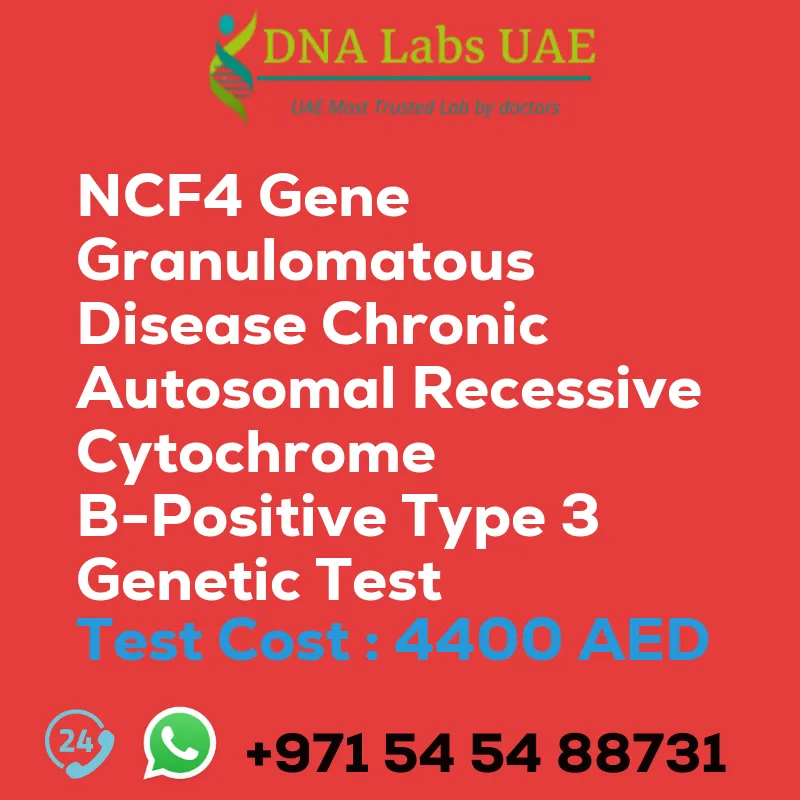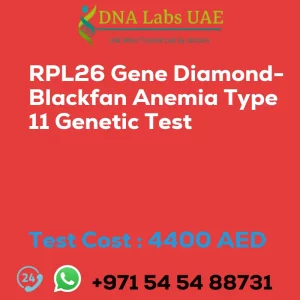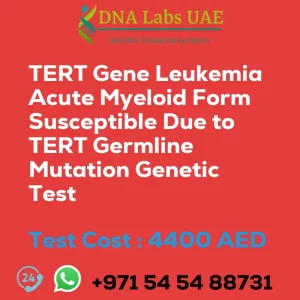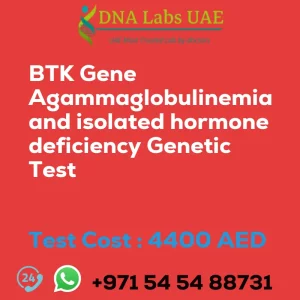NCF4 Gene Granulomatous Disease Chronic Autosomal Recessive Cytochrome b-Positive Type 3 Genetic Test
Components
- Price: 4400.0 AED
- Sample Condition: Blood or Extracted DNA or One drop Blood on FTA Card
- Report Delivery: 3 to 4 Weeks
- Method: NGS Technology
- Test Type: Hematology
- Doctor: Hematologist
- Test Department: Genetics
Pre Test Information
Clinical History of Patient who is going for NCF4 Gene Granulomatous disease, chronic, autosomal recessive, cytochrome b-positive, type 3 NGS Genetic DNA Test. A Genetic Counselling session to draw a pedigree chart of family members affected with NCF4 Gene Granulomatous disease, chronic, autosomal recessive, cytochrome b-positive, type 3 NGS Genetic DNA Test gene NCF4.
Test Details
The NCF4 gene is associated with a condition called chronic granulomatous disease (CGD). CGD is a rare genetic disorder that affects the immune system, specifically the ability of certain white blood cells to kill bacteria and fungi. CGD is inherited in an autosomal recessive manner, meaning that an individual must inherit two copies of the mutated NCF4 gene (one from each parent) to develop the condition.
The NCF4 gene provides instructions for making a protein called p40phox, which is involved in the formation of a complex called NADPH oxidase. This complex plays a crucial role in the immune system by producing reactive oxygen species (ROS) that help kill bacteria and fungi. Mutations in the NCF4 gene result in a deficiency or dysfunction of p40phox, leading to impaired ROS production and an increased susceptibility to recurrent infections. These infections often manifest as granulomas, which are inflamed masses of tissue that form in response to the presence of foreign substances.
The diagnosis of CGD can be confirmed through genetic testing, such as Next-Generation Sequencing (NGS). NGS is a high-throughput method that allows for the simultaneous analysis of multiple genes, including the NCF4 gene. By sequencing the individual’s DNA, any mutations or variations in the NCF4 gene can be identified, helping to establish a definitive diagnosis of CGD.
It is worth noting that there are different types of CGD, categorized based on the specific gene mutations involved. The type 3 CGD is associated with mutations in the NCF4 gene, which is also referred to as cytochrome b-positive CGD due to the presence of cytochrome b in the NADPH oxidase complex.
Genetic testing for CGD can provide valuable information for individuals and their families, including confirmation of the diagnosis, identification of carrier status, and potential implications for family planning and management of the condition. However, it is important to consult with a healthcare professional or genetic counselor to fully understand the results and their implications.
| Test Name | NCF4 Gene Granulomatous disease chronic autosomal recessive cytochrome b-positive type 3 Genetic Test |
|---|---|
| Components | |
| Price | 4400.0 AED |
| Sample Condition | Blood or Extracted DNA or One drop Blood on FTA Card |
| Report Delivery | 3 to 4 Weeks |
| Method | NGS Technology |
| Test type | Hematology |
| Doctor | Hematologist |
| Test Department: | Genetics |
| Pre Test Information | Clinical History of Patient who is going for NCF4 Gene Granulomatous disease, chronic, autosomal recessive, cytochrome b-positive, type 3 NGS Genetic DNA Test. A Genetic Counselling session to draw a pedigree chart of family members affected with NCF4 Gene Granulomatous disease, chronic, autosomal recessive, cytochrome b-positive, type 3 NGS Genetic DNA Test gene NCF4 |
| Test Details |
The NCF4 gene is associated with a condition called chronic granulomatous disease (CGD). CGD is a rare genetic disorder that affects the immune system, specifically the ability of certain white blood cells to kill bacteria and fungi. CGD is inherited in an autosomal recessive manner, meaning that an individual must inherit two copies of the mutated NCF4 gene (one from each parent) to develop the condition. The NCF4 gene provides instructions for making a protein called p40phox, which is involved in the formation of a complex called NADPH oxidase. This complex plays a crucial role in the immune system by producing reactive oxygen species (ROS) that help kill bacteria and fungi. Mutations in the NCF4 gene result in a deficiency or dysfunction of p40phox, leading to impaired ROS production and an increased susceptibility to recurrent infections. These infections often manifest as granulomas, which are inflamed masses of tissue that form in response to the presence of foreign substances. The diagnosis of CGD can be confirmed through genetic testing, such as Next-Generation Sequencing (NGS). NGS is a high-throughput method that allows for the simultaneous analysis of multiple genes, including the NCF4 gene. By sequencing the individual’s DNA, any mutations or variations in the NCF4 gene can be identified, helping to establish a definitive diagnosis of CGD. It is worth noting that there are different types of CGD, categorized based on the specific gene mutations involved. The type 3 CGD is associated with mutations in the NCF4 gene, which is also referred to as cytochrome b-positive CGD due to the presence of cytochrome b in the NADPH oxidase complex. Genetic testing for CGD can provide valuable information for individuals and their families, including confirmation of the diagnosis, identification of carrier status, and potential implications for family planning and management of the condition. However, it is important to consult with a healthcare professional or genetic counselor to fully understand the results and their implications. |








